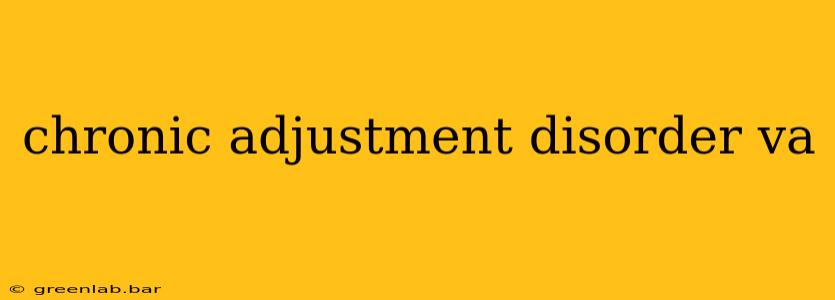Chronic adjustment disorder is a significant mental health condition that can profoundly impact a veteran's life. Understanding its nuances, how it differs from other diagnoses, and navigating the Veterans Affairs (VA) system for treatment are crucial for those affected. This comprehensive guide aims to shed light on chronic adjustment disorder and the support available through the VA.
What is Chronic Adjustment Disorder?
Adjustment disorder is a mental health condition triggered by a stressful life event. While acute adjustment disorder typically resolves within three months, chronic adjustment disorder persists for longer than six months. This prolonged struggle can significantly impair daily functioning, relationships, and overall well-being. The stressor may be a single event, such as a traumatic injury in combat, or a series of ongoing stressors, like the challenges of reintegrating into civilian life.
Symptoms can vary widely but often include:
- Persistent sadness or low mood: A pervasive feeling of unhappiness that doesn't lift, even with positive experiences.
- Anxiety and worry: Excessive concern, fear, and nervousness that interfere with daily activities.
- Emotional numbness: A feeling of detachment or emptiness, making it difficult to connect with others or experience emotions fully.
- Social withdrawal: Reduced interaction with friends and family, leading to isolation.
- Difficulties at work or school: Inability to focus, decreased productivity, and potential job loss.
- Sleep disturbances: Insomnia, nightmares, or excessive sleepiness.
- Irritability and anger: Increased frustration, anger outbursts, and difficulty managing emotions.
Differentiating Chronic Adjustment Disorder from Other Conditions
It's important to distinguish chronic adjustment disorder from other mental health conditions that may share similar symptoms, such as:
- Post-Traumatic Stress Disorder (PTSD): PTSD stems from exposure to a traumatic event, whereas adjustment disorder arises from a broader range of stressors, though trauma can certainly be a trigger. The symptoms of PTSD are often more intense and specific to the traumatic event.
- Major Depressive Disorder (MDD): While both conditions involve low mood, MDD is characterized by a more pervasive and persistent state of depression that may not be directly linked to a specific stressor.
- Generalized Anxiety Disorder (GAD): GAD involves chronic, excessive worry that is not tied to a specific event or stressor, unlike adjustment disorder.
Accessing VA Healthcare for Chronic Adjustment Disorder
Veterans experiencing symptoms of chronic adjustment disorder can access comprehensive care through the VA healthcare system. This includes:
- Mental health evaluations: A thorough assessment by a VA psychiatrist or psychologist to diagnose the condition and rule out other possibilities.
- Therapy: Various therapeutic approaches, such as Cognitive Behavioral Therapy (CBT) and Dialectical Behavior Therapy (DBT), are effective in managing symptoms.
- Medication management: In some cases, medication may be prescribed to help manage symptoms like anxiety or depression.
- Support groups: Connecting with other veterans who understand the challenges of chronic adjustment disorder can provide valuable peer support and a sense of community.
- Case management: A dedicated case manager can help coordinate care and connect veterans with other necessary resources.
Navigating the VA System: Tips for Success
Getting the support you need can sometimes feel challenging. Here are some helpful tips:
- Schedule an appointment promptly: Don't delay seeking help; early intervention improves outcomes.
- Be prepared to describe your symptoms in detail: The more information you provide, the better the healthcare professionals can understand your needs.
- Communicate openly with your healthcare provider: Maintain open communication about your progress and any concerns.
- Advocate for yourself: Don't hesitate to ask questions or seek clarification if anything is unclear.
- Utilize available resources: Explore all the services the VA offers, including therapy, support groups, and case management.
Conclusion: Hope and Recovery are Possible
Chronic adjustment disorder can be a significant challenge, but it's not insurmountable. With the right support and treatment, veterans can manage their symptoms, improve their quality of life, and achieve lasting recovery. The VA offers a range of services to help veterans navigate this condition and reclaim their well-being. Remember that seeking help is a sign of strength, and you're not alone. Don't hesitate to reach out to the VA or other mental health professionals for support.

